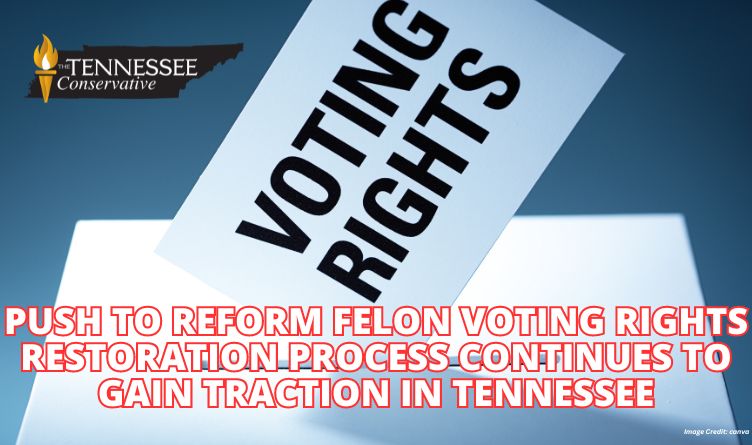Image Credit: canva
The Tennessee Conservative [By Olivia Lupia] –
Numerous organizations, including the Tennessee NAACP, Campaign Legal Center, and Free Hearts, a non-profit working with families through the incarceration process, have been advocating for reform to Tennessee’s notably rigorous process to restore voting rights to felons after serving their sentences, even bringing a lawsuit against the state of Tennessee in 2020.
Last week, a Nashville judge ruled on a controversial portion of the voting restoration, which may ultimately help tip the scales in favor of reformation.

Many of these organizations claim Tennessee’s process for restoring voting rights is convoluted and expensive, with excess burden and strain placed on those who, in many cases, already struggled with their restitution costs.
The restoration process includes gaining a certificate of restoration, a complex and often inconsistent process, proof that all financial debts and costs, including child support, are paid or appropriately on schedule, and that gun rights be restored before voting rights are considered.
Judge Angelita Blackshear Dalton’s ruling restored the voting rights of four people whose felony offenses bar them from having a gun, though a state directive dictates gun rights as a prerequisite before being allowed to cast a ballot again.
Dalton cited Tennessee state case law allowing these individuals to still get their voting rights and other citizenship rights back, despite the gun rights caveat.

The number of felons eligible to restore their voting rights but who have not engaged in the process is estimated to be between 300,000-500,000 depending on the source, roughly 10% of the state’s voting-age population. And within that percentage, fewer than 1%, approximately 3,350 Tennesseans, have had their voting rights restored since 2018. There is also no appeals process if restoration is denied.
Many reform advocates claim the Tennessee Supreme Court decision of July 2023 regarding felons who have moved to Tennessee and their ability to vote added to the already stringent regulations and has further hindered those seeking the restoration of their rights.
However, some victims’ rights advocates disagree that the path to restoration should be eased.
Verna Wyatt, co-founder of Tennessee Voices for Victims, supports those who have been able to restore their rights through the current process but also doesn’t “think it should be something that is automatic. They broke trust with the community and, many times, they broke trust in a very, very big way. That’s part of accountability and consequences.”

There have been legislation efforts to address this issue on both sides of the political aisle in the past, though the actions have been unsuccessful.
Republican House Speaker Cameron Sexton weighed in on the issue, saying he would need more details before determining his support for any legislation, but strongly disagreed with the term “disenfranchisement” in relation to those who lost their vote because of a felony offense. “They disenfranchised themselves by committing the crime. I don’t consider the state disenfranchising them when they are the ones who committed the crime.”
Governor Bill Lee also appeared open to the idea of reformation of the restoration system, commenting this week, “I certainly believe that our state should provide the opportunity for our citizens to vote in every way and to encourage them, all of them, to vote,” and agreeing to watch a New York Times video critiquing Tennessee’s restoration requirements.
The judge’s verdict seems indicative that change to the restoration process might become a hot topic over the coming weeks as many are pushing to have their voting rights restored by the October 7 registration deadline for eligibility to vote in the November 2024 election.


Olivia Lupia is a political refugee from Colorado who now calls Tennessee home. A proud follower of Christ, she views all political happenings through a Biblical lens and aims to utilize her knowledge and experience to educate and equip others. Olivia is an outspoken conservative who has run for local office, managed campaigns, and been highly involved with state & local GOPs, state legislatures, and other grassroots organizations and movements. Olivia can be reached at olivia@tennesseeconservativenews.com.




6 Responses
I don’t know why anyone is upset about this. It’s not like they’re allowing people in prison to vote. HOWEVER: If you are convicted of a crime (whether felony or misdemeanor), you pay the fine or do the time as part of your debt to society. Once you have paid your debt to society, you should be able to participate as a full citizen in society, and that includes the right to vote. If you can give me a reason why this should not be the case, I’d like to hear it.
Abuse by authorities have resulted in loss of rights of many citizens, permanently most often. Minor drug possession crimes have resulted in this harsh punishment. These people should have their rights restored upon completion of sentence, good standing with financial responsibilities and probationary requirements. Gun rights should also be returned to them similarly. However, people who commit serious felony crimes that involve intimidation, threat of weapon violence, home invasion, car jacking, felonious assault and injury in the perpetration of a felony, are criminals that should never be allowed to vote or carry guns again. Rapist , murderers, child rapist/molesters and such heinous people should certainly be permanently banned from voting or gun possession. Heinous crimes deserve permanent repercussions that both punish and prevent the criminal from being a threat , in any manner, to society, ever again. You lose your trustworthiness and acceptance of your opinion by society, along with your decision to become a serious criminal. I for one do not want perverts, robbers, thieves and other serious criminals having any role in electing our leadership, ever! We give them mercy by not executing them or throwing away the key. WE offer parole and probation far too generous already to many violent criminals. Serving their time is not all society should require of them! Reformed behavior, carefully monitored probation and restrictions of their freedoms should follow their crimes for their lives, for the protection of society and for justice for their victims. You can never fully trust a dog who savagely bites you, again. A serious criminals mind is worst than a dogs, they have betrayed the public trust and can no longer be trusted, only monitored.
Well said!!
That seems like a really big grey area. Who gets to decide which crimes are too heinous to allow the perpetrator to vote again? The PUNISHMENT should fit the crime, not punitive measures after one has paid his debt to society.
Got a 40+ neighbor who’s been straight arrow since his 18 yr. old self got a felony conviction for involvement in an insurance arson for a much older “friend”.
He hasn’t tried to get his rights restored because of the convoluted expensive(lawyer) process.
YES, it NEEDS reformed.
You did your time. It should be the end of it. Today however some people get little if any time for extreme cases.
Our system doesn’t work. Instead of a piecemeal approach lets fix it all.